Positive reinforcement is a powerful tool for fostering self-motivation and achieving team success. By incorporating these strategies into our personal and professional lives, we can create an environment where individuals are driven to excel and collaborate effectively. One of the most fundamental aspects of positive reinforcement is the simple act of recognizing and rewarding achievements. When individuals achieve their goals or demonstrate exceptional effort, acknowledging their accomplishments with praise and tangible rewards can go a long way in boosting their motivation. This recognition provides a sense of accomplishment and validation, encouraging them to continue putting in their best effort. Moreover, setting clear and achievable goals is essential for self-motivation and team success. When individuals and teams have a clear sense of direction and purpose, they are more likely to stay motivated and work together cohesively. Goals should be specific, measurable and relevant to the tasks at hand. Regularly revisiting and revising these objectives ensures that they remain relevant and challenging, driving individuals and teams to constantly improve.
Another crucial aspect of positive reinforcement is fostering a growth mindset. Encouraging individuals to view challenges and setbacks as opportunities for learning and growth can help maintain motivation even in the face of adversity. When mistakes are seen as stepping stones to success rather than failures, individuals are more likely to persevere and maintain a positive attitude. Team leaders and managers play a pivotal role in cultivating this mindset by providing constructive feedback that emphasizes improvement rather than criticism. In addition to individual motivation, creating a culture of teamwork and collaboration is essential for overall success. Positive reinforcement can be applied to encourage teamwork by recognizing and celebrating collective achievements. When teams work well together and accomplish their goals, acknowledging their efforts and the value they bring to the organization can boost team morale and foster a sense of unity. Team-building activities and regular communication also play a significant role in strengthening the bonds between team members.

Furthermore, providing opportunities for skill development and growth is a powerful motivator. When individuals see that their efforts lead to personal and professional development, they are more likely to stay engaged and motivated. This can involve offering training programs, mentorship opportunities or simply allowing individuals to take on new challenges and responsibilities within the team. In conclusion, positive reinforcement strategies are indispensable for promoting self-motivation and team success. By recognizing and rewarding individual and team achievements, setting clear goals, fostering a growth mindset, encouraging teamwork and providing opportunities for growth, we create an environment where individuals are driven to excel and collaborate effectively. These strategies not only enhance motivation but also contribute to the overall success and well-being of both individuals and teams, leading to a more productive and harmonious work environment.

